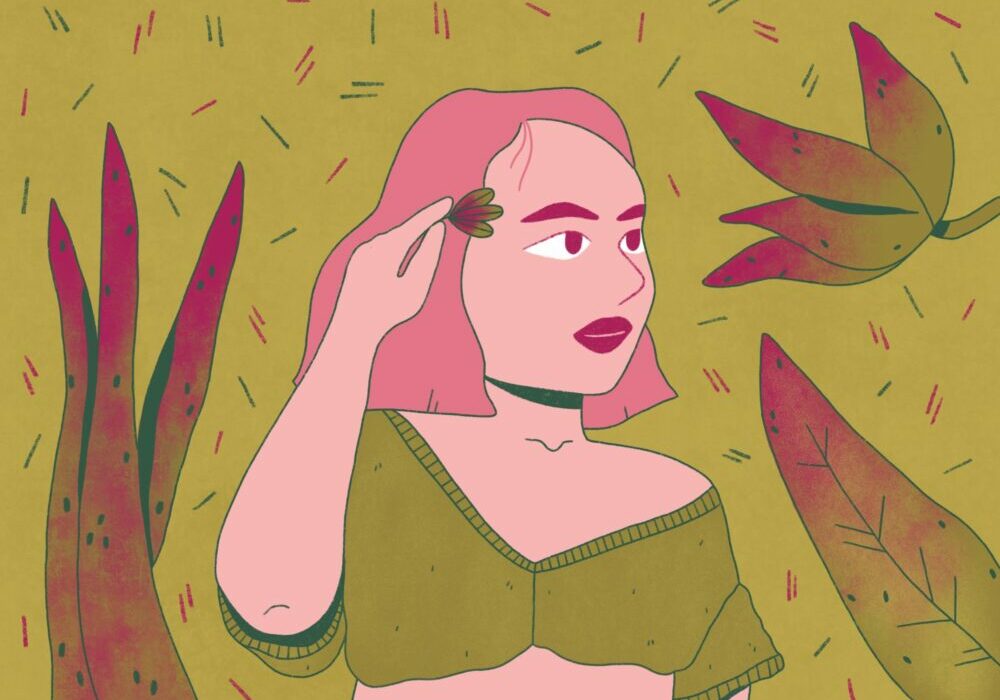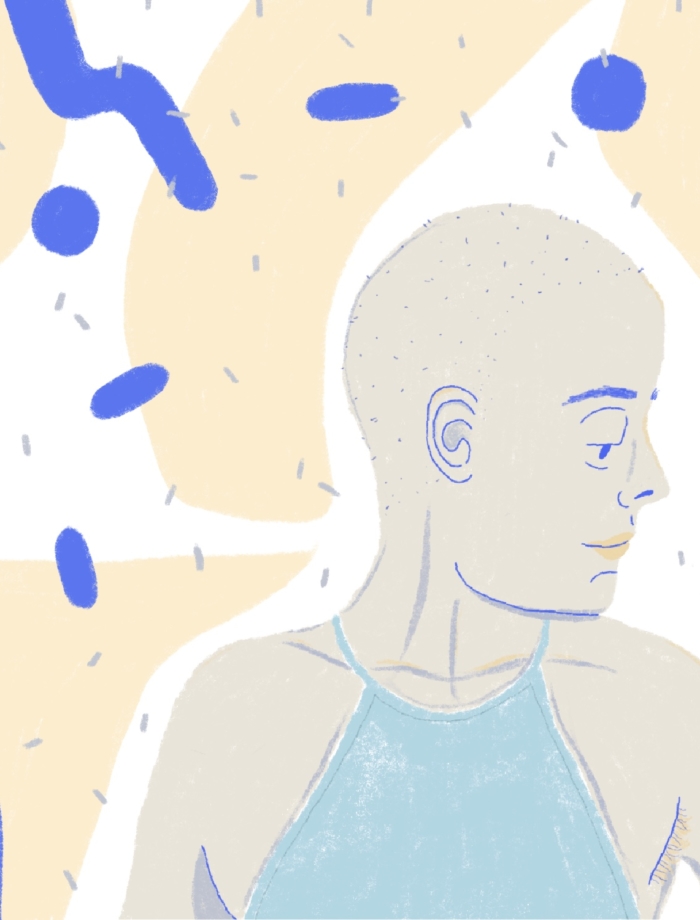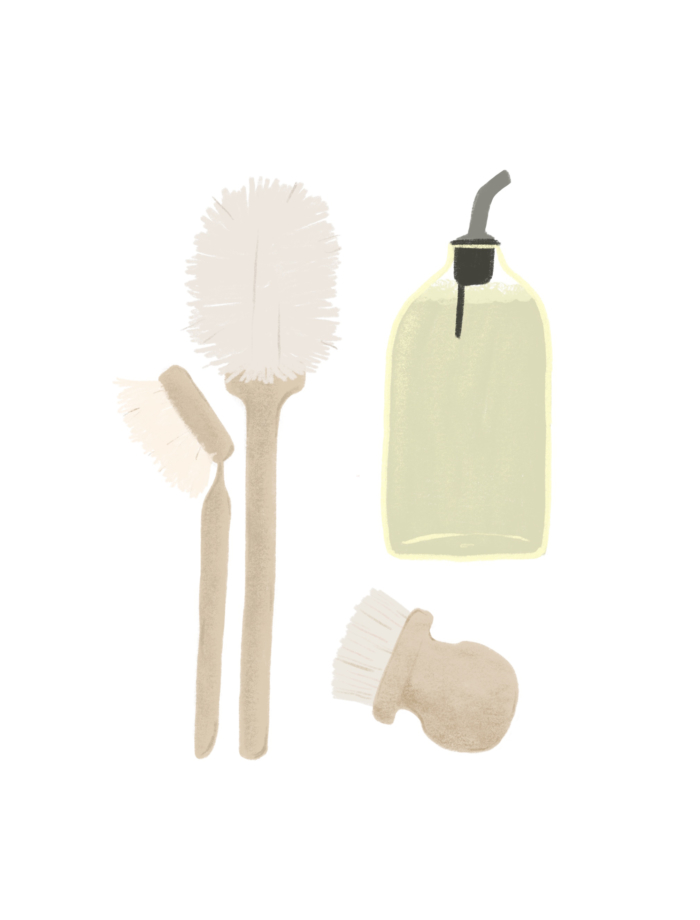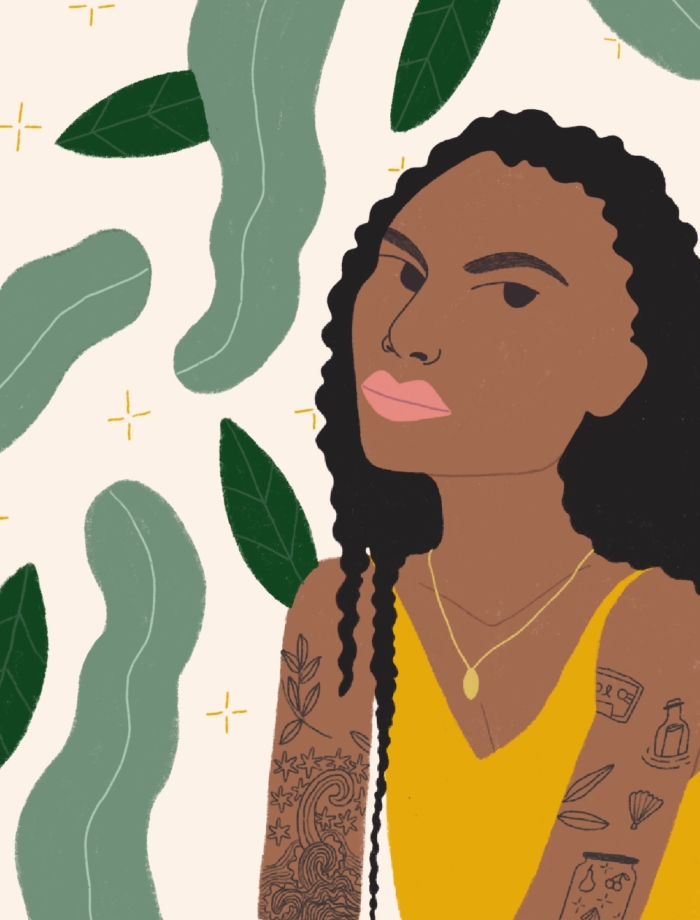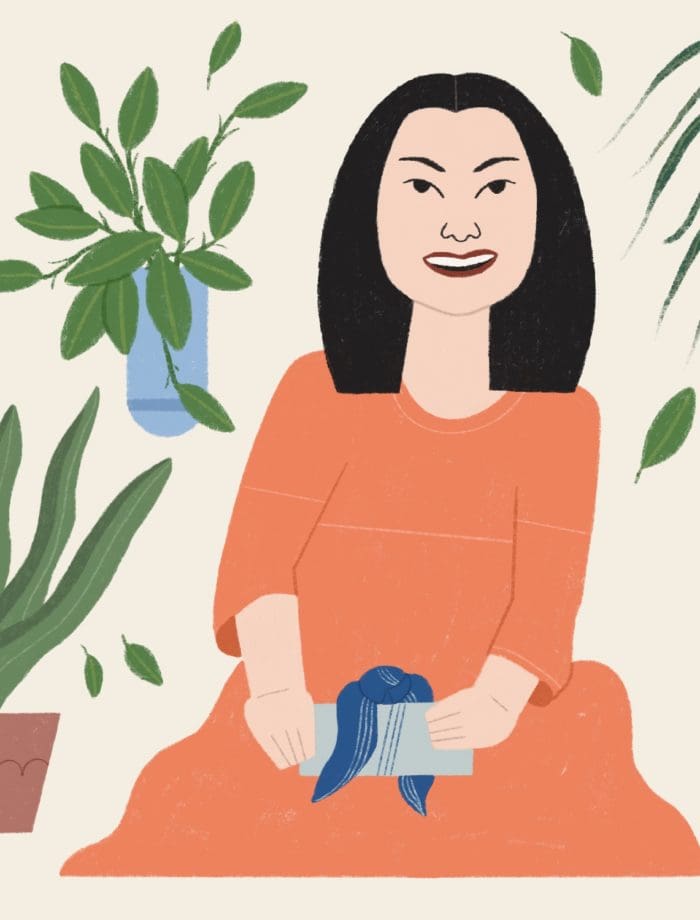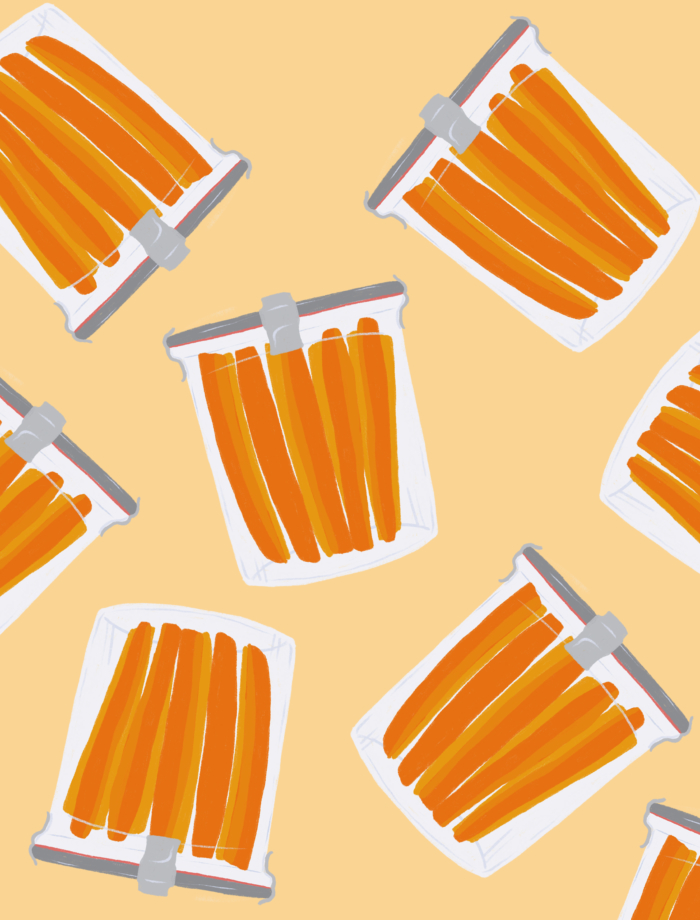Illustration by Hawnuh Lee.
Sabs Katz is a writer, sustainable living advocate, and co-founder of Intersectional Environmentalist — an environmental media and resource hub that explores the intersections of social and environmental justice. I got to talk to Sabs the day before she was travelling back to her home in Brooklyn after a stretch staying with family in Houston. We talked about her blog and low waste inspo-packed YouTube channel, co-founding an organization that’s made great strides bringing social justice to the forefront of environmental conversations over the course of just a few months, and her dreams and intentions for 2021 and beyond.
How did you get interested in environmentalism and start working in this field?
I wasn’t a huge eco kid growing up. I recycled and I had one of those ‘Save the Trees’ pins, but that was kind of the extent of it. When I was a junior in college, a friend and I decided to take the plunge and try out the zero waste lifestyle. For the most part I was very intimidated — it was such a difficult concept — but we challenged ourselves to do it for a whole semester and I ended up loving it. I had gone vegan around the same time as well, so that was kind of my entry point.
A year later I started my blog, Sustainable Sabs. I began by talking about zero waste and plastic free living, and sharing recipes and the different vegan food I was eating. This was while I was still a student at Boston University. I moved to New York the next year and kind of evolved my blog into a more holistic perspective on sustainability. The zero waste mindset can be perfectionistic and unattainable at times, and can cause unnecessary anxiety, so I tried to emphasize low impact rather than zero waste living.
I studied advertising in school, which is like the bane of capitalism, so that’s kind of funny. I was preparing for a career in the nonprofit space. I just wanted to focus on something that made the world a better place, and I didn’t know what sector that would be in until finding my passion in sustainability. Early on, blogging was more for my own accountability and to get inspiration from other people. I didn’t expect it to grow as much as it did.
I started out writing longer form pieces on tumblr. I remember one of the posts that I was proud of talked about different materials like viscose or acetate in clothing and how I didn’t know what they were or where they came from. I would just do a lot of research and pull together what I learned. I launched a YouTube channel a year and a half ago because I had just left my job and I was like, ‘Maybe I can make this blogging stuff work?’ I’m still hoping to be able to monetize videos at some point because I really enjoy making them.
Tell me about how you became a co-founder of Intersectional Environmentalist.
In May of this past year, after the murder of George Floyd and Breonna Taylor, I started talking more about the intersections between social justice and environmentalism on my platforms, and connected with other bloggers who were doing the same. I was living at home in Texas, and I got to meet some of those sustainability and social justice bloggers during a trip to Austin. Leah Thomas, who is now the founder of Intersectional Environmentalist, organized a call with all of us, and that was where IE was born.
We recognized that, unfortunately, there was going to be a time in which talking about Black Lives Matter was not going to be trendy anymore, and we wanted to capture the momentum that was already there — because so many people were talking about environmental racism and why we should be having those conversations in the sustainability world. Leah had a post go viral on Instagram where she defined what intersectional environmentalism was, and so when we were on that call we were like ‘This is a moment, and we can really turn it into a movement.’
We came up with the idea of creating a website that aggregated resources because there was so much information being shared on social media. All of these infographics and posts are great, but can be intimidating if you don’t know where to start. We wanted to be that first jumping-off point. And here we are seven months and 245K followers on Instagram later, it’s been a really cool and exciting journey.
IE grew so much so quickly! Tell me more about where the organization is at now.
A lot of what we do is raising awareness and creating resources. We’re working with a team of eight interns who are helping us create video and graphic content. We also have an environmental justice research intern who is helping us write a piece on the intersectional history of environmentalism, because a lot of that history has been very whitewashed. We’re doing an accountability program where companies participate and learn how to be more sustainable and intersectional. Soon we’re going to be kicking off a mentorship program where individuals can sign up and get paired with an IE council member as a mentor to share advice on how to continue with their activism. We are also developing a nonprofit arm which will be focused on grant opportunities, events, and other exciting things like that.
How has your approach to sustainability changed over the past year?
At the beginning of the pandemic (and still now) there was so much that was unpredictable and so much that we couldn’t control. A lot of zero waste living hinges on having control of all of your inputs and outputs, which in and of itself is a huge privilege. So I think reminding myself that reducing plastic isn’t the only way — or necessarily the best way — to have a positive impact has been one of the biggest mindset shifts.
It’s not that I just had that realization, but this year has cemented it for me. Like I can’t go to the bulk store anymore, so I just have to recognize that it might be a ‘lesser of two evils’ situation. And now being faced with these limitations, I can also empathize more with what most of the country has in terms of choices all the time — access to things like bulk groceries or package free products is a privilege unique to where I live and the resources I have.
I’m trying to find tradeoffs. So even though I’m accumulating more recycling, I’m also finding ways to cut down on food waste. I’m connecting with community members in my local buy nothing group on Facebook to find out where to bring compost. Fortunately, I’m still able to go to the farmer’s market, and now I’m even more appreciative of that. I’ve made donations to local aid funds with the stimulus money that I received. And I try to keep my activism as local as possible. Our voices can stretch so much farther in our own communities. And when you succeed in making change there, other communities can see that and they might be able to do the same.
What are your big hopes and dreams for IE and for your career personally?
Our goals for IE are centered on influencing other industries to take an intersectional and sustainable approach to their business. Having conversations and influence at the policy level is also something that we aspire to do. One organization that really inspires us is the Sunrise Movement, which does a lot of amazing grassroots organizing.
For me personally, continuing to get the message out and reframe the narrative around environmentalism to incorporate a more intersectional perspective is the ultimate goal. So working with IE is definitely the dream job. I’m working full time on it right now, as are all the IE co-founders.
It’s been such a whirlwind and there have been so many incredibly exciting things we’ve been able to do. One that sticks out was our collaboration with Allbirds. They put up posters around NYC, LA, and San Francisco, and they partnered with BIPOC graphic designers we recommended to create a campaign around intersectional environmentalism. Getting to see our posters up on Houston St. was one of my highlights of last year.
People like to knock individual action, but there is so much power in every single person’s voice, and if it were not for all of those voices we would never be able to make change. If every person thought signing a petition or calling their senator would never have an impact, nothing would ever get done. We need everybody as a collective to work together to create a more livable, habitable future. I would love it if more people recognized the power that we all have to make a difference.
One thing you changed your mind about in 2020?
I changed my mind about holding onto relationships that did not serve me, and I distanced myself from those relationships in a healthy way.
One thing you want to learn or try in 2021?
I want to pursue more community oriented activism, whether that is mutual aid groups or finding a local composting center and learning more about compost — just getting more involved in things in my direct neighborhood.
Current favorite meal to make for yourself?
Toasted everything bagel with avocado, more everything but the bagel seasoning, and nutritional yeast.
Current favorite outfit to put on?
Black linen house pants and my green linen button down top. Linen is always my comfy outfit.
Three simple tips for someone who wants to live a little bit more sustainably?
- You don’t need to go out and buy all of the sustainable products. Use what you have. A mason jar is great as a reusable waterbottle.
- Don’t let your food go to waste. Food that’s in a landfill ends up creating a lot more methane than even plastic or anything else like that. Minimizing food waste is something I think most people can do regardless of where they are in their sustainability journey.
- Eat more plant-based! That’s often an easy way to majorly cut down on the energy and resources that are associated with the food you consume.
A few fav Instagram follows?
@sustainablebk — A nonprofit founded by Dominique Drakeford and Whitney Mcguire who both really inspire me.
@sarah.robertson.barnes — Sarah’s a personal friend of mine and talks candidly about sustainable living with kids and being a mom.
All of the other IE co-founders: @greengirlleah, @diandramarizet, @philthefixer
Honestly, everyone on the IE Council. Every single time I have a council meeting I am in awe that I am able to be in the presence of these incredible minds.
Thank you for taking the time to share your story and refreshingly approachable take on sustainable activism with us, Sabs! We are so excited to see what IE will accomplish next. In the meantime, please find me sprinkling EBTB seasoning on an avocado bagel.
